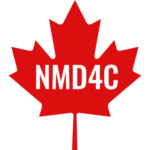Neuromuscular Fellowship Funding Competition
About the Competition
The Neuromuscular Disease Network for Canada (NMD4C) together with Muscular Dystrophy Canada (MDC) host this annual funding competition to award postdoctoral fellowships in neuromuscular disease (NMD) research, and national clinical fellowship awards in neuromuscular medicine and electromyography.
This annual funding competition provides salary support for early-career scientists to conduct postdoctoral studies in a laboratory focused on research of NMDs, and early-career clinicians to participate in a neuromuscular medicine and electromyography training programs. Successful applicants are eligible to receive funding over a one-year period for both the postdoctoral and the clinical fellowships.
Since 2022, this competition has provided over $1.2 million in funding to support neuromuscular postdoctoral researchers and clinical fellows in Canada. These fellowships have been made possible by generous supporters of MDC with three clinical fellowships from the Canadian Society of Clinical Neurophysiologists through an unrestricted educational grant from Grifols Canada, and one clinical fellowship through an unrestricted educational grant from Roche Canada.
The NMD4C and MDC are committed to empowering the next generation of early-career researchers and clinicians in building successful careers in NMD research and clinical practice. When provided with access to research funding and clinical fellowship opportunities, researchers and clinicians are more likely to develop core competencies, perform meaningful research and make long-term commitments to the field of NMDs. Empowering the next generation of researchers today will lead to improved neuromuscular care, research, treatment, and health outcomes for all Canadians tomorrow.
Eligibility Criteria
Clinical fellowship eligibility criteria
- Applicants must be Canadian citizens or permanent residents who have completed postgraduate training in adult or pediatric neurology or physiatry in a Royal College of Physicians and Surgeons of Canada accredited program at the time of commencement of the fellowship (at least one Canadian citizen/permanent resident will be awarded funding).
OR
- International/Canadian applicants who have completed postgraduate training in adult or pediatric neurology or physiatry outside of Canada that have met the Royal College of Physicians and Surgeons of Canada requirements, will be eligible if they have the support of the proposed Canadian fellowship training director.
Postdoctoral research fellowship eligibility criteria
- Applicants must hold a PhD, received no more than 36 months from the date the degree was conferred, before the time of application. For clinician-scientists, this application should be submitted within two years after completion of their final clinical training. Exceptions to the above 36 months eligibility period will be considered due to delays in training or extenuating circumstances. Applicants may apply for this fellowship before completing their terminal degree, if they have a firm commitment from the laboratory head in which training will take place.
- Applicants should not hold another full salary fellowship concurrently; however, salary support received from this fellowship can be supplemented by their supervisor.
- Applicants need not be Canadian citizens; however, they are required to be conducting their research at a Canadian research institution.
- The proposed research project and training must be related to a specific or multiple neuromuscular disorders under the mandate of MDC.
- Only 1 renewal can be awarded per fellow.
Note: Applicants who have previously received an NMD4C/MDC post-doctoral fellowship are eligible to reapply.
Evaluation Process
Clinical fellowship evaluation process
Each application will be scored based on:
- Past accomplishments in clinical care, education and research
- Clinical and academic leadership potential in neuromuscular care and electromyography
- Commitment to advancing neuromuscular care in Canada
- Quality of the training plan
- Quality of the training environment
- Educational resources available to the trainee
- Expertise and commitment of the training director and other clinical neurophysiologists
- Track record of training leaders in neuromuscular care and electromyography
Postdoctoral research fellowship evaluation process
Each application will be scored based on:
- Review panel’s assessments of the application
- Letters of support
- Consideration of all applications in pool
- Reports of the reviewers
Summarized anonymous feedback will be provided for all applications submitted, whether they were successful or not.
Application Process
Please consult the competition guidelines for application information.
Competition Deadlines
2026 Clinical Fellowship
Competition Opened: May 1, 2025
Application Deadline: June 12, 2025
Notification of Funding: July - August 2025
Funds Available: July - September 2026
2026 Postdoctoral Research Fellowship
Competition Opens: September 2, 2025
Application Deadline: October 14, 2025
Notification of Funding: December 2025
Funds Available: February - September 2026
Contact
Please direct all questions about the neuromuscular fellowship competition to our Network Manager, Erin Beattie
